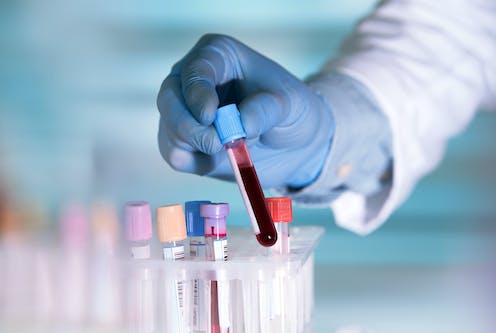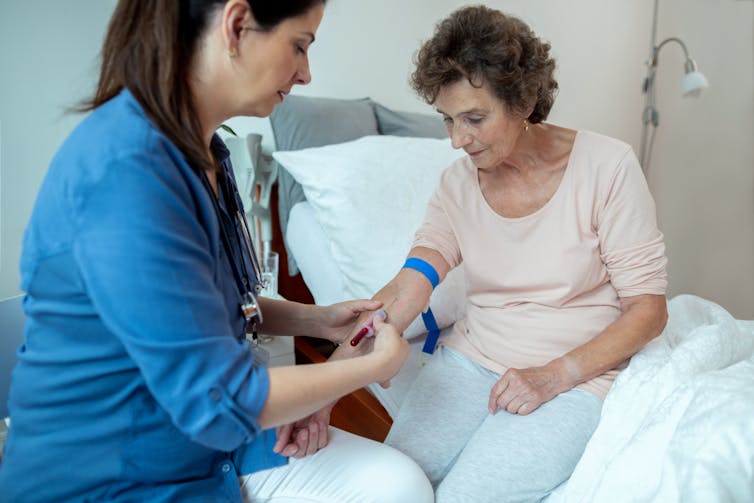
Despite affecting 55 million people worldwide, Alzheimer’s disease still has no cure. But recent advancements in the field have seen a number of promising drugs that can slow the disease’s progression pass late-stage clinical trials.
The catch with these types of drug is that they’re most effective when taken soon after symptoms begin. Unfortunately, current diagnostic techniques may not catch Alzheimer’s early enough for these drugs to have a marked effect.
Evidence suggests that signs of Alzheimer’s disease could be detected in the blood up to 20 years before symptoms start. Catching the disease this early could have a major effect on treatment outcomes for patients.
A couple of US companies have now developed Alzheimer’s blood tests that are available for consumers to purchase, either direct from the supplier or at the request of the patient’s doctor. But while these tests can detect signs of the disease, their results should still be interpreted with caution.
Table of Contents
Alzheimer’s disease diagnosis
Alzheimer’s disease is diagnosed using a combination of tests.
Cognitive tests look at a person’s memory recall and thinking abilities. Biomarker tests look for signs of the disease in a person’s body, in a brain imaging scan or sample of cerebrospinal fluid (the liquid that surrounds the brain and spinal cord). These biomarkers have been found to correlate with three major signs of Alzheimer’s disease:
- An accumulation of amyloid-beta plaques outside brain cells
- Tau protein tangles inside brain cells
- Brain cell death (known as neurodegeneration).
Not all of these signs need to be present for a person to be diagnosed with Alzheimer’s disease, although the presence of amyloid-beta plaques and/or tau tangles in the brain are essential. Conversely, some people may have biomarker changes but may never develop Alzheimer’s disease symptoms.
As these biomarker changes can be detected in the blood years before other signs appear in the brain, this could provide a faster and less invasive way of diagnosing Alzheimer’s disease.
Blood tests
Most of the blood tests currently available to purchase measure two different types of amyloid-beta in the blood: amyloid-beta 42 and amyloid-beta 40. The ratio between these two proteins is then calculated. The lower the ratio is, the higher a person’s likelihood of having amyloid plaques and therefore Alzheimer’s disease.
One such test, PrecivityAD, has been approved for doctors to use in people who exhibit symptoms of Alzheimer’s in the US, and has been deemed safe for use in the European Union. In patients with cognitive symptoms, doctors will send a blood sample to the company which then measures the amyloid-beta ratio. The company also looks for another protein, called apolipoprotein E, to investigate the patient’s genetic risk of Alzheimer’s.

Newman Studio/ Shutterstock
An algorithm then accounts for the biomarker levels and patient’s age, providing a probability score. A high score means the patient probably has Alzheimer’s disease. Results are available within a few days.
The PrecivityAD test has been used in several studies and has shown a high correlation with signs of Alzheimer’s disease. But this does not mean it’s 100% accurate all the time, and nor can it predict how the disease will progress in that person.
Studies that have used this test also excluded certain participants (such as those with chronic health conditions) to avoid affecting how the test’s results were interpreted. The majority of the participants were also white. This makes it uncertain how accurate these tests will be for people of diverse backgrounds or those with other health conditions.
Another test, produced by Quest, measures the same amyloid-beta ratio. This test can be purchased directly by the consumer without a doctor’s referral – although you’ll need to book a time to have your blood sample collected.
This test has not yet been approved in the US or EU, nor has it undergone the extensive testing PrecivityAD has. In addition, the results may be complicated for the average person to interpret without the help of a doctor.
Accurate results
It’s important to interpret your results from these tests carefully for a couple of reasons.
At the moment, these tests only look for one of the biomarkers of Alzheimer’s disease. This means that it can’t detect signs of other forms of dementia – and only provides information on one aspect of Alzheimer’s disease itself. So even if a person’s test comes back negative for Alzheimer’s, if they’re experiencing other concerning symptoms (such as memory loss), it’s important they visit a GP as they could still have another form of dementia – or another condition altogether.
On the other hand, if the test is used by someone with no symptoms but who has abnormal biomarkers, this could cause unnecessary distress – making them think they have, or will develop, Alzheimer’s.
Although these tests are useful in investigating the possibility of having Alzheimer’s disease, using them in isolation is still not as accurate as the tests currently used by qualified doctors. But this area is rapidly evolving and, someday, these tests may be just as good.
Researchers are now looking at how accurate tests looking at concentrations of tau protein in a patient’s blood are. Tau may be more accurate than amyloid-beta at detecting both plaques and tangles in a patient’s brain.
There are also a few tests in development that look at both tau and amyloid-beta – including a newer version of PrecivityAD, namely PrecivityAD2. Other tests in development look at additional biomarkers, including a very promising finger-prick test, which has shown a good correlation with brain scans and cerebrospinal fluid results so far.
It’s clear that exciting advancements are happening in the field to make Alzheimer’s disease diagnoses more accessible and accurate. Once these tests are refined to improve accuracy, they could offer new hope to patients – allowing them to be diagnosed and treated in the early stages of the disease.
![]()
The authors do not work for, consult, own shares in or receive funding from any company or organization that would benefit from this article, and have disclosed no relevant affiliations beyond their academic appointment.























